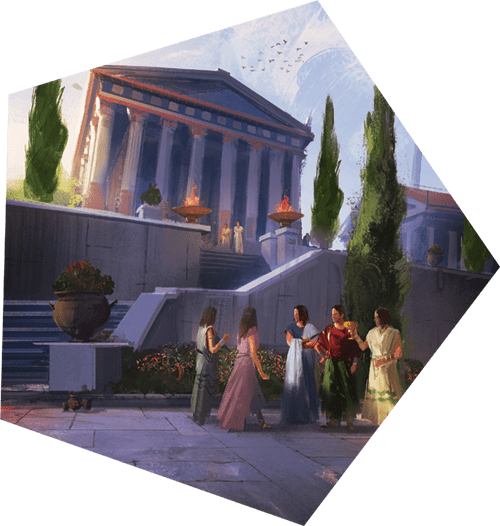Vision
To equip students to apply writing and grammar skills to craft effective written and oral communication that engages with and contributes to culture.
Goals
- To ensure mastery of English grammar and mechanics
- To develop mastery of study, reference, and research skills, effectively using print and digital sources
- To model the connection of mentor texts to grammar instruction and writing activities
- To give opportunities for students to use the writing process with genre-specific strategies to craft communication for real-world contexts
- To guide students to hone collaboration, listening, speaking, and viewing skills
- To expand technology and media literacy through written, oral, and visual communication
- To lead students to draft writing that is truthful, virtuous, and empathetic
Program Approach for Literature
Build Vocabulary
Central to reading comprehension is simply knowing what the words in a text mean. To help students acquire new vocabulary, BJU Press literature courses don’t just give definitions for students to memorize, although listed definitions and vocabulary lists will also be available. We give teachers the tools to help students use what they already know as well as learn how to extract the meaning of a word from its natural context.
Prior to reading the text, the teacher instructs students about each literary work, introducing new vocabulary words and encouraging students to predict what the words mean. The teacher will often have sample sentences to read to the students to aid the students in determining meaning from context. Other times, the teacher encourages students to break words apart into their prefixes, roots, and suffixes to allow students to decode words based on prior knowledge. In group activities, students will collaborate to predict what words might mean, determine the meaning, and practice using new words correctly. During reading, margin notes will provide quick definitions for new vocabulary words so that students can keep reading without being distracted by an unfamiliar word.
Model Reading Strategies and Literary Skills
To teach students how to interact with literary texts, the teacher will find modeling sections throughout the teacher edition. These sections identify opportunities to model new concepts, including reading strategies. The teacher will model analyzing illustrations, finding examples of literary terms, creating and using graphic organizers, and much more.
Give a Range of Reading Opportunities
Students develop a rich cultural understanding by interacting with selections from a variety of authors, genres, and time periods. Literature 6, 7, and 8 include opportunities for novel studies. Literature 9 and 10 include a complete play in each course. American Literature (11) and British Literature (12) offer a comprehensive overview of the development of literature from early to contemporary writings.
| Novel Study Included | |
|---|---|
| Literature 6: Perspectives in Literature | The Book of Three, A Single Shard, Island of the Blue Dolphins |
| Literature 7: Exploring Themes in Literature | The Last Battle |
| Literature 8: Making Connections in Literature | Across Five Aprils |
| Literature 9: Fundamentals of Literature | Cyrano De Bergerac |
| Literature 10: Elements of Literature | Romeo and Juliet |
In addition to the novel studies and excerpts of other longer works, the student anthologies include a variety of grade-appropriate, relevant selections that have been chosen to engage students. Selections include the following:
- Informational texts
- Biographies
- Autobiographies
- Poetry
- Television and theater dramas
- Memoirs
- Newspaper, magazine, or internet articles
Interpret and Evaluate Images
Students continue to practice and develop visual analysis skills throughout the BJU Press middle and high school literature program. Units begin with a two-page spread that the teacher uses to lead a discussion about visual analysis and art appreciation. The teacher editions include additional opportunities for visual analysis in single-page illustrations and cartoons. Activities for students include a variety of visual analysis activities that allow the teacher to guide students through a more detailed analysis.
Develop Cultural and Historical Literacy
Literary works do not emerge from a vacuum. Every writer imprints a part of himself or herself on his or her writing, which is heavily influenced by family history, cultural history, travel experience, historical events of the time period, or major life events. In the BJU Press literature line, we encourage students to read with an awareness of who the writer is or was, the major events that occurred in the author’s lifetime, and the writer’s view of his or her society or culture. To do that, we provide the teacher with the tools to frame a piece of literature in its cultural or historical context for the students before they begin reading the selection. The teacher may lead a classroom activity that explores relevant information from the author’s background or simply inform students of those details. The teacher may also choose to lead a discussion concerning how the selection intersects with current events. This part of the reading process impresses upon students the importance of doing historical or cultural research as a reading strategy that enables them to better understand and engage with what they are reading.
Teach Literary Discernment and Biblical Responses
Literature studies allow students to engage with different cultures, perspectives, and worldviews from the safety of the classroom, where the study can be guided and the teacher can use worldview shaping questions to encourage students to think through the implications of literary perspectives. Students can learn how their peers think, which worldviews they hold, and then respond to alternate perspectives from a biblical worldview. As students engage with each selection, the teacher can regularly lead discussions, activities, and brief writing assignments that help students work through biblical worldview shaping objectives. Unit questions encourage students to think about literary themes while engaging a biblical worldview.
Include Individual and Collaborative Communication Practice
Suggested activities in the BJU Press middle and high school literature program help the teacher motivate students to practice verbal and written communication skills and incorporate technology skills. Students will regularly have opportunities to participate in Think-Pair-Share activities, complete Quick Write activities, longer writing activities, and oral presentations. Suggestions for enrichment and additional engagement will also encourage students to do their own research to find additional background details about the selections they have been reading.


